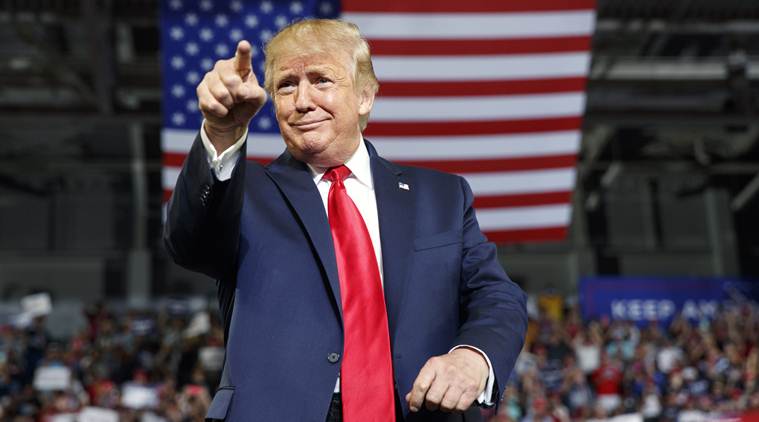
Dawn, which has otherwise been fairly critical of US President Donald Trump on his erratic foreign policy stances, Twitter policy announcements, et al, seems to have changed its tune somewhat in the aftermath of Prime Minister Imran Khan and army chief Qamar Bajwa’s visit to the White House. In its July 24 editorial, the newspaper appears to welcome Trump’s offer to mediate the Kashmir dispute. It is also somewhat flippant in its dismissal of New Delhi’s denial of the US president’s assertion regarding Narendra Modi’s offer — “He actually said would you like to be mediator or arbitrator? said Mr Trump, quoting the Indian leader”.
While maintaining that Trump’s diplomacy has had mixed results — the success with North Korea on the one hand, the escalation with Iran on the other — the editorial contends that “Mr Trump’s maverick tactics may just be what the Kashmir issue needs”.
There is an element of balancing, of not taking a clear position in the editorial. It seems to stand for a bilateral solution, or at best a trilateral one where Kashmir and its people are a separate party, but also calls for multilateral interference: “At the end, it is Pakistan, India and the Kashmiris who will have to take the final decision to resolve this over seven-decade-old imbroglio. But a little friendly ‘push’ from powerful global actors may help the stakeholders reach a mutually acceptable solution. Moreover, Indian rigidity has left little hope on the bilateral front, especially under Mr Modi’s watch, as Delhi keeps harping on about ‘terrorism’, without earnestly responding to Pakistan’s offers for dialogue. Whether it is the US, the UN, or other global players, clearly a multilateral framework may be able to provide a conducive atmosphere for the resolution of the Kashmir issue.”
The cost of dinner
Muhammad Amir Rana, a security analyst and columnist for Dawn writes on July 28 of Islamabad and Rawalpindi’s task after the successful visit by the country’s leader(s) to Washington. Rana first points out the significant diplomatic gains from the visit: “The country is set to gain in the whole process as India has failed to develop its relevance in the Afghan peace process. On this ground alone, Pakistan’s establishment considers it a major achievement. Similarly, the US offer of mediation over the Kashmir issue has put pressure on Indian Prime Minister Narendra Modi. It has happened at a time when the Trump administration was not comfortable with India’s recent multibillion-dollar deals with Russia, and trade tensions between the two nations were rising.”
While India being sidelined in Afghanistan certainly benefits Pakistan, it must now deliver on the expectations it has generated for the US. The country’s role in bringing the Taliban to the negotiating table has certainly been welcomed in Washington. But now “to keep this momentum, the government has to deliver on Afghanistan. The probability of direct talks between the Taliban and Kabul would be one challenge, but influencing the former to commit to a lasting ceasefire could prove another daunting task.”
Another important political success for Imran Khan actually came before the dinner. M Bilal Lakhani writes in The Express Tribune on July 28 that “Khan’s packed jalsa… enabled him to defuse the primary attack against his legitimacy, on being selected, with Mike Pompeo, the American Secretary of State, commenting on his rockstar reception. The jalsa strengthened Imran’s hand as we walked into the White House, the morning after.”
Mob and state
The mob, and its violence in the name of justice, is an issue that seems to resonance across South Asia. Badiuzzaman Bay writes in The Daily Star on July 27 on the issue of mob violence and punishment in Bangladesh but his arguments and observations will certainly find resonance in both India and Pakistan. Here’s the immediate context: “As of July 23, seven people died and at least 35 were injured in mob beatings sparked off by a rumour about human heads being collected—yes, you heard it right—for the construction of Padma Bridge, the dream project of the Awami League government.”
Bay lays some of the blame for “mob justice” on the failure of the state and its legal institutions. But he traces a curious and disturbing form of assertion in such violence as well: “To understand the gravity of this loss, one only needs to take a look at any of the video clips that are now circulating through the social media, showing the lynching of Taslima Begum Renu in Badda, on July 20. It was nauseating to watch as an angry crowd gathered to “punish” the single mother-of-two for her rumoured attempt to kidnap a child. Only, she didn’t do it. But at that rare empowering moment in their life, those people were judge, jury and executioner at the same time. And the world was suddenly reduced to a choice between a weapon and a shield.”
What’s worse, in their mind, the people that form the mob “were doing the right thing”.